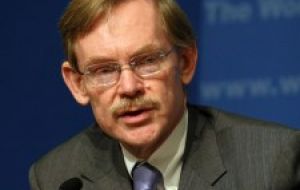MercoPress. South Atlantic News Agency
World Bank sees “currency devaluations” tensions and “bubble” risks
 President Robert Zoellick: “money is chasing yield”
President Robert Zoellick: “money is chasing yield” World Bank President Robert Zoellick said he sees tensions arising from currency devaluations as nations seek to boost their economies, though he doesn’t expect them to turn into “wars.”
“I don’t foresee that we’re moving into an era of currency wars but there’s clearly going to be tensions, particularly if you have countries that have trade or current-account surpluses that are intervening to keep their currencies at lower rates,” Zoellick said on a conference call with journalists Monday.
Japan last month sold the Yen for the first time in six years to spur exports and economic growth, joining countries across Asia and Latin America that have tempered gains in their currencies against the dollar. Brazil’s Finance Minister Guido Mantega warned last week of a “currency war” and said that his government will buy all “excess dollars” in the market to curb the appreciation of the Real.
China has incurred international criticism for limiting gains in its exchange rate. The Yuan has risen about 2% versus the dollar since the People’s Bank of China in June pledged greater flexibility in the currency after pegging it around 6.83 for two years.
China’s Premier Wen Jiabao called Monday for “relatively stable” exchange rates, rebuffing U.S. calls for a stronger appreciation of the Yuan to trim China’s trade surpluses.
Slow growth in mature economies and fast expansion in emerging ones is creating distortions in financial markets, Zoellick said.
“Money is chasing yield, it can’t find those yields in developed economies,” Zoellick said. “This is not only pushing up currency values in emerging and developing countries, it’s also pushing up the price of some assets, with the risks of bubbles in property and some commodities”.
Net private capital flows to emerging-market economies will rise to 825 billion US dollars in 2010 from 581 billion in 2009, the Institute of International Finance, a Washington-based industry group that represents some of the world’s largest commercial banks and financial firms, said in a report.
Global growth, though it has returned, has slowed since May and “won’t be fast enough to make inroads” into unemployment, he said. The World Bank doesn’t expect a ‘double-dip’ recession and forecasts global expansion of 3.5% this year and 3.3% next year, Zoellick said.




Top Comments
Disclaimer & comment rulesCommenting for this story is now closed.
If you have a Facebook account, become a fan and comment on our Facebook Page!